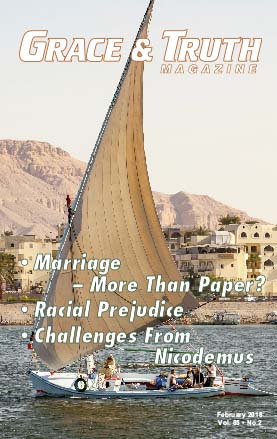
By Eugene P. Vedder, Jr.
Have you ever faced questions like these:
- Who am I, and why am I of a certain race?
- Why do people of different races often not get along well with each other?
- Why are so many people, often even Christians, racially prejudiced, sometimes even to the extent of persecuting or killing one another?
- Is one particular race best?
When God created mankind He created them male and female. God does not tell us in His Word the color of Adam and Eve. Scientists speculate, research and periodically come up with new theories. Famous artists have painted rather intriguing pictures, and most children’s storybooks have their own depictions of Adam and Eve. It is interesting that believers, especially children, in various parts of the world often portray persons in Scripture to look like themselves. In other words, they identify with them. The race each one of us belongs to is the human race; and truly, God’s Word is for each one of us.
Genesis 1 says clearly that God created mankind male and female. Chapter 2 shows that the female was created from the male and was given to him by God to complete him and give him joy. These are the only two kinds of people God made – and He made them so they would need one another and that the human race would go on. Ephesians 5:21-33, one of many Scripture portions that refers to this, points out that what God gives us in Genesis is a beautiful picture of something even more wonderful: Adam and Eve represent Christ and the Church. Christ loved the Church and gave Himself in death for it, and now is graciously preparing it to be His bride forever in glory. This picture shows us too what God’s will is for the loving, self-sacrificing relationship of husband and wife in marriage.
More important than race, Acts 17:26 tells us that God “has made from one blood every nation of men to dwell on all the face of the earth, and has determined their preappointed times and the boundaries of their dwellings” (NKJV). While there are several different blood types which one must be careful to distinguish when giving blood transfusions, none of these types is specific to one race. If I would need a blood transfusion, the race of the person providing the blood would not matter. And when God speaks of sinners, He tells us that all have sinned. He never breaks this down by race, as men so often do with statistics. We can be thankful that in this day of grace God offers salvation freely to “whosoever will” (Rev. 22:17 KJV). The Bible assures us that God is no respecter of persons. Men make differences among people, race and color, but God makes no such distinction.
When we read Genesis 6-9, we see that because of man’s wickedness God destroyed mankind off the face of the earth through a tremendous flood, which even covered the tops of the mountains. Only one family of eight persons – Noah, his wife, their three sons and their sons’ wives – was spared. From them, the present population of the earth has descended. As one traces their progeny through Genesis 10 and 11, it becomes plain that Shem was the one through whom the Savior eventually came. He was the ancestor of the people of Israel as well as of their Arabic-speaking Middle Eastern neighbors. Japheth was the ancestor of the people who lived in Europe. Ham, whose name means “black,” was the ancestor of the majority of Africans and the probable ancestor of most Asians and Native Americans. Ham’s descendents were very practical and are credited with the largest amount of the great inventions of ancient times.
Returning to Acts 17:26 we see that God in His wisdom has “determined their preappointed times and the boundaries of their dwellings” (NKJV). In His wonderful grace He has fitted people for the environments in which He has placed them, even though people have moved, and have often been moved, to many places besides their ancestral homes. A man with dark skin living near the equator can really thank our all-wise and all-loving God that He has made him that way, for science says his skin does not sunburn as easily as others. This is but one reason to appreciate God’s provision for people. There are many other such evidences of our Creator-God’s loving, tender care for His creatures too.
In Matthew 11 we see the Lord Jesus Christ, God’s Son, looking back over the past years of His ministry. He spoke sadly as He denounced cities where He had done many of His mighty works, but who had not believed on Him. Then we see our Lord Jesus turning to His God and Father and saying, “I thank You, Father, Lord of heaven and earth, that You have hidden these things from the wise and prudent and have revealed them to babes. Even so, Father, for so it seemed good in Your sight” (vv.25-26).
This statement of the Lord’s must ultimately be our answer as Christians to questions about how God has made us – things we do not understand. Human reasoning is not going to give us the answer. God’s Word tells us of God’s love for us. It tells us of His goodness and His wisdom. It tells us that He has blessed us with every spiritual blessing in the heavenlies in Christ Jesus. Scripture tells us that “He who did not spare His own Son, but delivered Him up for us all, how shall He not with Him also freely give us all things?” (Rom. 8:32). The Bible reminds us to “behold what manner of love the Father has bestowed on us, that we should be called children of God!” (1 Jn. 3:1). And it tells us that we are soon going to be like our Lord Jesus, for we shall see Him as He is. May we with the apostle Paul say, “By the grace of God I am what I am, and His grace toward me was not in vain” (1 Cor. 15:10).
Another thing: In John 9 the disciples asked the Lord why the man who was blind from birth was blind, whether it was because he or his parents had sinned. The Lord answered that it was not for either of these reasons, but that the works of God should be revealed in him. The chapter goes on to detail how the blind man was healed and how this brought him into much difficulty with the Pharisees. In fact, eventually he was cast out of the synagogue, but through all these problems he became a worshiper of the Lord Jesus.
I would suggest that you, whoever you are, were born the way you were not because of any sin of your own or of your ancestors, but that the works of God should be revealed in you. God may have uniquely fitted you to be able to serve Him where you are or in a place or situation in which He is getting ready to place you. For a person of another race to do the work He gives you to do could very well be a much more complicated and difficult matter.
Passing on to the subject of prejudice, especially racial prejudice, we have noted that God is no respecter of persons. God has made the different races. He does not play favorites. His grace reaches out to all. Again and again He exhorts us to be like Him. In the Old Testament we find Him repeatedly exhorting His people Israel to show kindness to the strangers among them. Prejudice is one of the ugly products of pride. It is taking an attitude of superiority to another individual, race or group in society. It is totally un-Christlike.
Again consider Acts 17:26, where we see that God “has determined [every nation of men’s] pre-appointed times and the boundaries of their dwellings.” Sinful man has done much to disturb this order. Rulers have moved peoples they subjugated to other places. In the Bible, the conquering Assyrians did so with the people of the ten-tribe kingdom of Israel, and the Babylonians with the people of Judah. In later years African chiefs often sold their captives to Arab, European, or American slave traders, and these captives were forced into slavery in lands far from their homes. Today, vast numbers of people are trying to escape from warfare, persecution, poverty or other difficult situations by migrating to nations where they feel their condition will be better. Many are losing their lives in the process, and countless others are deeply resented or hated. Human pride, jealousy, lust and other sinful conditions of heart are causes of such wicked attitudes and the deeds that spring out of them.
How sadly different such attitudes are to the loving heart of our God who desires all men to be saved and to come to the knowledge of the truth. His Son, our Lord Jesus Christ, still extends His loving invitation to all mankind, regardless of race or skin color: “Come to Me, all you who labor and are heavy laden, and I will give you rest. Take My yoke upon you and learn from Me, for I am gentle and lowly in heart, and you will find rest for your souls. For My yoke is easy and My burden is light” (Mt. 11:28-30). How have you responded to Him?







